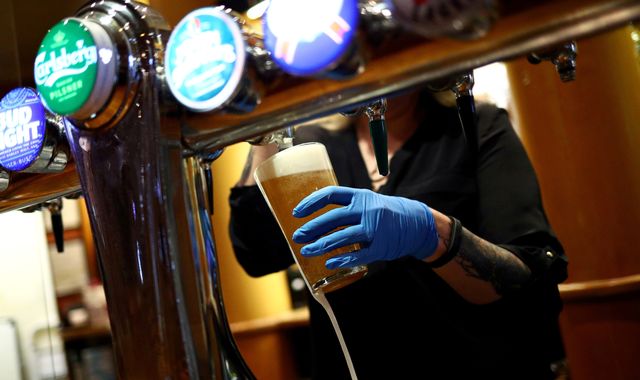COVID-19: ‘Large wave’ of infections if restrictions were eased too fast and some measures will be needed beyond 2021, scientists warn
Written by News on 22/02/2021
The UK would face another “large wave” of coronavirus infections if lockdown restrictions were lifted too quickly and some measures will be needed beyond 2021, government scientists have warned.

Speaking before the prime minister unveiled his “roadmap” for ending England’s lockdown, Sir Patrick Vallance said there is a risk of “flying blind” if all restrictions are scrapped at once.
The chief scientific adviser explained that it takes about four weeks to assess the impact that lifting a restriction has on COVID-19 cases – as he backed easing the lockdown in stages.
Follow live coverage on Sky News as the PM addresses the House of Commons and leads a Downing Street news conference at 7pm
In the Commons on Monday, Boris Johnson said current measures will be lifted in four stages – with a goal of schools reopening on 8 March, beer gardens and hairdressers returning on 12 April, and all legal limits on social contact being removed on 21 June.
However, the prime minister warned these dates were not set in stone – and that the threat from the virus “remains substantial”.
A study by Imperial College London has found that – even under the most optimistic set of assumptions – at least 30,000 more COVID deaths could occur. This figure rises to well over 100,000 if rules are relaxed rapidly.
In the briefing to journalists, Sir Patrick said that while vaccines are expected to make “a big difference”, there are still uncertainties around vaccine efficacy, the proportion of the population that will have the jab, the level of restrictions needed longer term, and whether the virus will be seasonal.
He added: “Even with high vaccine levels, and indeed quite high vaccine coverage, it’s important to remember a large number of people in the population remain unprotected.
“It’s likely you get an increase in cases when you start to open up – exactly when that occurs and exactly how high the numbers are, it’s not possible to be precise.
“The sooner you open up everything, the higher the risk of a bigger resurgence. The slower you do it, the better.”
It comes after a new Public Health England report found among the over-80s that a single shot of the Pfizer vaccine cuts the chance of hospital admission and death from COVID-19 by more than 75%.
A separate study involving 23,000 health workers in England also found those who received a single dose of the Pfizer jab had at least a 70% lower chance of becoming infected 21 days after vaccination, rising to 85% after a second dose.
Professor Angela McLean, the government’s deputy chief scientific adviser, said in a scenario with “very fast unlocking”, where most restrictions were lifted by late April, “it’s pretty clear… that we would expect a large wave”.
She added: “It’s common sense why that happens.
“There remain people who have either not been vaccinated or even though these vaccines are absolutely fantastic, they are not perfect.
“There are people who have been vaccinated who are nevertheless not protected from severe disease.
“If we let a big epidemic happen amongst young people, some of those older, more vulnerable people – or vulnerable for other reasons – will get infected and will be very ill.”
Senior Tory MP Mark Harper, who heads the COVID Recovery Group of lockdown-sceptic backbenchers, has said all legal restrictions put in place in response to the pandemic should be lifted by the end of April.
By that time, the top nine priority groups – including all over-50s – should have been offered a first dose of COVID-19 vaccine.
But in Monday’s briefing, Sir Patrick said: “You really don’t know what effect these unlocking measures will have until you’ve done them.
“The soonest you can really understand the effect is probably about four weeks.
“So you will be flying blind on this if you don’t wait.”
The government’s scientific advisers have considered a document produced by the Imperial College COVID-19 Response Team – including Professor Neil Ferguson – that modelled the effect of different scenarios for lifting lockdown restrictions.
In the document, called “Unlocking” Roadmap Scenarios for England, the team warns that “vaccination alone will not be sufficient to keep the epidemic under control” due to “eligibility and vaccine hesitancy”.
“Non-pharmaceutical interventions (NPIs) must be lifted slowly and cautiously to minimise the number of deaths and prevent high hospital occupancy, with some baseline NPIs remaining in place (and adhered to) throughout 2021 and beyond,” the experts say.
“Relaxing too quickly… will result in peak hospital occupancy considerably higher than the current wave and substantial additional deaths.
“This holds regardless of vaccine efficacy, roll out, adherence to baseline NPIs, and impact of seasonality.”
The Imperial College team says even a “gradual” lifting of restrictions – with primary schools returning on 8 March before all schools on 5 April and restrictions being eased over several months before being fully lifted on 2 August – there would be a “substantial additional number of deaths”, with an estimated 58,200 fatalities by June 2022.
(c) Sky News 2021: COVID-19: ‘Large wave’ of infections if restrictions were eased too fast and some measures will be needed beyond 2021, scientists warn







